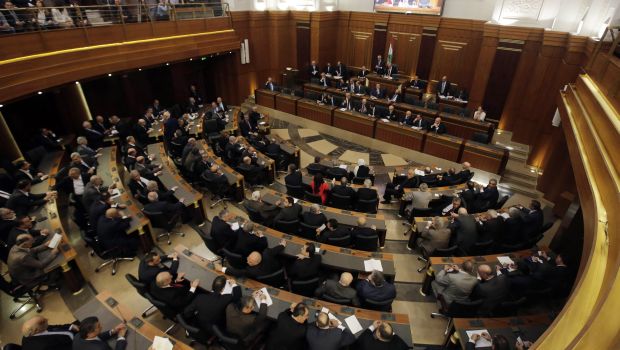
Lebanese members of parliament gather in the first session to elect the new president in downtown Beirut on April 23, 2014. (AP Photo/Joseph Eid, Pool)
The two main political factions remain split between rival candidates for the post, which under Lebanon’s confessional political settlement is traditionally held by a Maronite Christian.
Several sessions of parliament dedicated to choosing a new president have been boycotted by MPs, leaving the 128-member body unable to form the necessary two-thirds quorum.
But with less than three days until Suleiman’s term expires, some Lebanese lawmakers are clearly looking to avoid yet another political vacuum. Lebanon was without a government for the ten months prior to February this year, when Prime Minister Tammam Salam was able to form his government.
Parliament Speaker Nabih Berri said on Wednesday that he would call MPs to the chamber as soon as the quorum needed to choose a new president could be reached, saying that he would do so “even if we have to hold the election session at midnight.”
Lebanon’s rival political factions, however, appeared unwilling to compromise in order to resolve the issue.
The Future Movement, the largest party in the March 14 Alliance, reiterated its support for the candidacy of Lebanese Forces Party leader Samir Geagea, and called on the rival March 8 Alliance to nominate a candidate and allow the democratic process to take its course.
Meanwhile, the March 8 Alliance, which includes Hezbollah, continued to support Michel Aoun of the Free Patriotic Movement, although he had not announced his candidacy.
Aoun has reportedly pinned his hopes on winning the support of the leader of the Future Movement, Saad Al-Hariri, who has in turn linked his support for Aoun to the agreement of his Christian allies.
Talks between Hariri and Geagea aimed at finding a consensus candidate, held in Paris at the end of last week, went nowhere. A March 14 Alliance source who spoke to Asharq Al-Awsat on the condition of anonymity said Geagea had rejected Aoun as a potential consensus candidate during the talks.
The source alleged that Hezbollah’s refusal to officially nominate Aoun stemmed from his previous opposition to the organization and to Syrian influence in Lebanon, prior to signing a memorandum of understanding with Hezbollah in 2006.
The source said: “Hezbollah is aware of Aoun’s history and political track record, [and fears] that when he reaches power he may revoke any commitments he made and will not share power with anyone.”
But writer and political researcher Qasim Al-Qasir, who is known for his close links to Hezbollah, said: “Aoun is working on becoming a consensus candidate and not a March 8 Alliance candidate.”
Political leaders in Lebanon have begun calling on both sides to compromise and agree a candidate before May 25.
Outgoing Lebanese President Michel Suleiman called on parliament to remain in session until his successor can be chosen. In an official statement issued on Wednesday addressed to parliament, Suleiman said: “The Lebanese people deserve to have a new president before May 25,” adding that Lebanon is passing through a “historic stage” that requires its lawmakers to demonstrate “exceptional unity and interaction.”
Speaking to Asharq Al-Awsat on Sunday, Amine Gemayel, the leader of March 14’s Kataeb Party, called on both sides to be less “stubborn,” but said: “March 14 have expressed great flexibility in their dealing with the nomination, while we do not find the same flexibility in the dealings of the March 8 alliance.”
Gemayel served as Lebanon’s president between 1982 and 1988, and said earlier this year that he would consider returning to the role if he were certain of support across the spectrum of Lebanese politics, saying: “I will either be a consensus candidate or not a candidate at all.”
A number of Maronite organizations also condemned the political deadlock on Wednesday, saying in a statement released following a meeting in Bkerké that failure to reach an agreement on the next president in time “violates the Constitution, the National Covenant and risks the survival of the entity [the Lebanese state].”
Under Lebanon’s constitution, if Suleiman’s term expires before his successor can be chosen, the Council of Ministers would take on the duties of the president until one can be elected.
Caroline Akoum contributed reporting from Beirut
